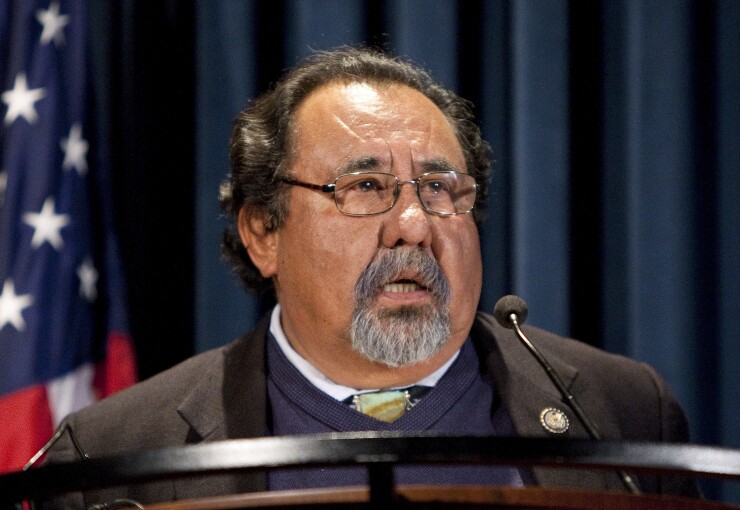WASHINGTON -- House Democrats are ratcheting up their scrutiny of austerity measures imposed on Puerto Rico and the slow disbursement of federal disaster aid to the commonwealth in the wake of Hurricane Maria.
The House Natural Resources Committee has scheduled a May 2 hearing to examine the successes and failures of the Puerto Rico Oversight, Management, and Economic Stability Act, also known as PROMESA, under which Congress established an Oversight Board to help the commonwealth restructure its heavy debt load.

Chairman Raul Grijalva, D-Ariz., told The Bond Buyer in an interview that his recent visit to Puerto Rico with a congressional delegation left him with the impression that the adverse impacts of the austerity measures may be hampering the island’s recovery.
The legislation that created PROMESA was a balancing act between Republicans and Democrats, Grijalva said.
“Our response as Democrats is a humanitarian one,” Grijalva said. “Theirs is primarily a fiscal integrity one. We tried to match them up, but Maria has kind of thrown all that upside down.”
The Oversight Board also is operating under a May 16 deadline to be reappointed or replaced under a ruling by the 1st Circuit Court of Appeals that their appointments were unconstitutional.
That decision is being appealed to the U.S. Supreme Court, but if the high court doesn’t take up the case President Trump will have to nominate a new board whose members will all be subject to confirmation by the U.S. Senate.
Grijalva’s committee also has scheduled an April 9 hearing on the future of the Puerto Rico Electric Power Authority and the timetable for rebuilding the commonwealth’s electrical grid.
Meanwhile, the office of the inspector general at the Department of Housing and Urban Development is making it a priority to investigate alleged interference by the Trump administration in dispersing disaster aid to Puerto Rico.
The money was appropriated by Congress under the Community Development Block Grant-Disaster Relief program.
Jeremy Kirkland, counsel to HUD’s inspector general, told a House oversight committee Tuesday his office is also investigating reports that a top HUD official resigned in January to protest the alleged White House interference.
Rep. Nydia Velazquez, D-N.Y., pressed Kirkland to quickly complete the investigation, citing a Washington Post story that President Trump asked his staff during an Oval Office meeting Feb. 22 for ways to limit federal support to Puerto Rico because of his belief it is taking money that should be going to the mainland.
“This is disgraceful,” Velazquez said.
The Senate, meanwhile, is debating a $13.45 billion disaster aid package that’s less generous to Puerto Rico than the package approved by the Democratic-controlled House in January.
Grijalva criticized the Senate’s requirement that would require Puerto Rico to assume a local share of additional FEMA aid rather than the 100% federal share in the House bill. “You hear that we’re going to drive the match up to 30%,” he said. “Puerto Rico can’t come up with that match. It just strikes me as punitive.”
Senate Democratic Minority Leader Chuck Schumer also criticized Trump, accusing the president of making up his own facts by claiming the federal government has already spent $91 billion on Puerto Rico’s disaster recovery when that’s the amount of damage caused by Hurricane Maria.
“The people of Puerto Rico are suffering, and they have received a sliver of the funding they need,” Schumer said Thursday in a Senate floor speech. “It is hard to fathom the depths of cruelty that it takes for the president to treat the people of Puerto Rico this way. They are American citizens.”
Some prominent Republicans have publicly supported statehood for Puerto Rico but none pushed for legislation to allow it to happen when the GOP was in control of the House and Senate, Grijalva said.
On Thursday, however, two House lawmakers announced the introduction of the bipartisan Puerto Rico Admissions Act.
The bill sponsored by Rep. Darren Soto, D-Fla., and Puerto Rico’s non-voting resident commissioner Jenniffer González, a Republican, is the first bill that would directly make Puerto Rico a state without requiring a plebiscite or any other conditions.
Grijalva expressed suspicion about the timing.
“Now when we take over the majority that becomes a pressing issue which I find kind of interesting,” he said. “I point that out. And now you have these comments by the president. You have a president that’s not entirely a cheerleader for Puerto Rico, to put it mildly.”





